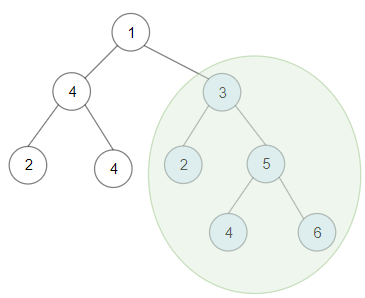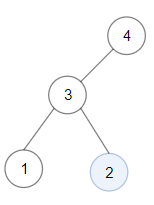LeetCode-in-Java
1373. Maximum Sum BST in Binary Tree
Hard
Given a binary tree root, return the maximum sum of all keys of any sub-tree which is also a Binary Search Tree (BST).
Assume a BST is defined as follows:
- The left subtree of a node contains only nodes with keys less than the node’s key.
- The right subtree of a node contains only nodes with keys greater than the node’s key.
- Both the left and right subtrees must also be binary search trees.
Example 1:

Input: root = [1,4,3,2,4,2,5,null,null,null,null,null,null,4,6]
Output: 20
Explanation: Maximum sum in a valid Binary search tree is obtained in root node with key equal to 3.
Example 2:

Input: root = [4,3,null,1,2]
Output: 2
Explanation: Maximum sum in a valid Binary search tree is obtained in a single root node with key equal to 2.
Example 3:
Input: root = [-4,-2,-5]
Output: 0
Explanation: All values are negatives. Return an empty BST.
Constraints:
- The number of nodes in the tree is in the range
[1, 4 * 104]. -4 * 104 <= Node.val <= 4 * 104
Solution
import com_github_leetcode.TreeNode;
/*
* Definition for a binary tree node.
* public class TreeNode {
* int val;
* TreeNode left;
* TreeNode right;
* TreeNode() {}
* TreeNode(int val) { this.val = val; }
* TreeNode(int val, TreeNode left, TreeNode right) {
* this.val = val;
* this.left = left;
* this.right = right;
* }
* }
*/
@SuppressWarnings("java:S1700")
public class Solution {
public int maxSumBST(TreeNode root) {
IsBST temp = checkBST(root);
return Math.max(temp.maxSum, 0);
}
private static class IsBST {
int max = Integer.MIN_VALUE;
int min = Integer.MAX_VALUE;
boolean isBst = true;
int sum = 0;
int maxSum = Integer.MIN_VALUE;
}
private IsBST checkBST(TreeNode root) {
if (root == null) {
return new IsBST();
}
IsBST lp = checkBST(root.left);
IsBST rp = checkBST(root.right);
IsBST mp = new IsBST();
mp.max = Math.max(root.val, Math.max(lp.max, rp.max));
mp.min = Math.min(root.val, Math.min(lp.min, rp.min));
mp.sum = lp.sum + rp.sum + root.val;
boolean check = root.val > lp.max && root.val < rp.min;
if (lp.isBst && rp.isBst && check) {
mp.isBst = true;
int tempMax = Math.max(mp.sum, Math.max(lp.sum, rp.sum));
mp.maxSum = Math.max(tempMax, Math.max(lp.maxSum, rp.maxSum));
} else {
mp.isBst = false;
mp.maxSum = Math.max(lp.maxSum, rp.maxSum);
}
return mp;
}
}

